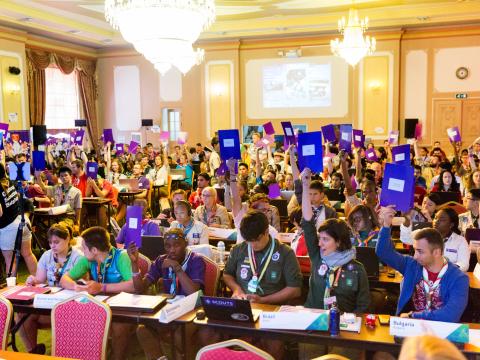5 ways the Youth Forum is strengthening youth involvement in decision making

The 40th World Scout Conference in Slovenia in 2014 made youth engagement one of the six strategic priority areas for World Scouting. This led to the development of a Youth Involvement Strategy that signified the Movement's commitment to youth involvement at all levels of Scouting and in decision making.
The strategy recognises that young people as active citizens have a right to be involved in making decisions that affect their lives. Not only is it their right to be involved, but it's also core to the Scout Method. Youth involvement isn't just about having young people at the table, it's about working in partnership with them to offer the tools and support they need to lead the change they want to see, whether it's in their communities or in their institutions.
According to the recently released Youth Involvement Strategy Final Report 2011-2021, “Young people are a tremendous source of energy, creativity and values that can shape a better future, both inside Scouting and in the local communities in which they live.”
This understanding that young people must be involved in decision making is a central element of the World Scout Youth Forum. Through the Youth Forum, young people have the opportunity to develop their skills and take part in key decision-making processes. Here are some of the key ways participants will engage in making decisions during the Youth Forum:
- Working in mixed International Teams: Through their International Teams, Youth Forum participants can learn about the decision-making process of the Youth Forum and Conference. Together they can collaborate and propose inputs to different documents for the decision of the Youth Forum. To learn skills in cooperation and lobbying, the teams must get their proposals to be seconded by at least one other International Team before they can be discussed and voted on. The decisions reached will be included in the final Youth Forum report to the Conference.
- Proposing and voting on Resolutions and Constitutional Amendments: The Youth Forum provides avenues for participants to discuss and propose draft amendments to the proposals put forward to the World Scout Conference, including Constitutional Amendments, Draft Resolutions, and Draft Objectives of the World Triennial Plan. Draft resolutions are decisions proposed to the World Scout Conference which provide direction for the future of the Scout Movement. The participants are supported by a workbook to prompt important questions for consideration. Importantly, any proposals passed by the Youth Forum will be considered by the Conference if subsequently proposed by Member Organizations.
“The process is very well structured with proper spaces and opportunities to discuss and go deep into each proposal that will be deliberated on and the final declaration of the Youth Forum. I believe the International Team system has been implemented very well. We are learning a lot on how to manage, prepare and behave in a virtual event and this is something that we need to consider for upcoming events.” - Melissa Wilm Senna Pinto, União dos Escoteiros do Brasil
- Drafting content for the Youth Forum Declaration: The Youth Forum Declaration is a statement of key messages that the participants would like to convey to WOSM and the world, and which helps guide the work of the Youth Advisors to the World Scout Committee in the next triennium. Youth delegates are invited to actively engage in the decision making of the Youth Forum and Conference to help shape the future of Scouting. This process is supported by a voting protocol outlined in the Rules of Procedures for both events.
- Electing Youth Advisors to the World Scout Committee: The Youth Forum elects six Youth Advisors to the World Scout Committee who play a key role in its decision-making. During the Youth Forum, participants learn about and engage with the 18 candidates to hear their ideas and plans for their candidacy. In the end, they vote to elect the six who will become their voice and support further strengthening of World Scouting's youth involvement work.
- Developing Personal Action Plans: Throughout the Youth Forum, participants take part in workshops that allow them to build bridges between the event and experiences back in their local communities. They explore and share their thoughts through a Personal Action Plan - the biggest innovation of the 14th World Scout Youth Forum. Delegates dive into many ideas and best practices to brainstorm on a project idea they want to implement back in their communities or National Scout Organizations.
“Decision making for me is the process of making a choice by identifying options through the information we have. In Movements like Scouting, it’s very important because it contributes to the organisational culture, allowing greater diversity and equal rights for all the members.” - Cardoso Bande, Liga dos Escuteiros de Moçambique
The outcomes of the decisions made by young people at the Youth Forum are included in a report to the Conference sharing the opinions and perspectives of young people about what is most important to them for the future of Scouting. This is just one step in a longer journey as a key part of the Scout Method that enables Scouts to continuously strengthen their ability and experiences to be involved in decision-making at the unit level, institutionally and in their communities.